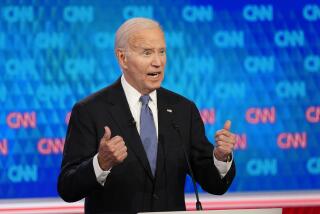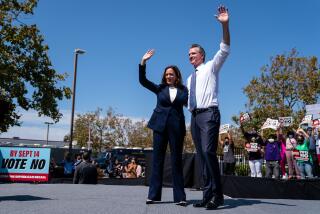Brown, Clinton Keep Ethics Feud Boiling : Democrats: Both candidates fuel the fire with sharp, angry comments on the campaign trail. Tsongas tries to stay out of dispute.
CHICAGO â Democratic presidential candidates Bill Clinton and Edmund G. (Jerry) Brown Jr. wrangled nastily about political ethics for a second straight day Monday, their arguments leaving former Sen. Paul E. Tsongas on the outside looking in on the eve of todayâs Illinois and Michigan primaries.
The contentious Brown-Clinton feud began in a televised debate Sunday night and continued Monday. The spat arose when the former California governor, citing a newspaper article that made no such allegation, accused Clinton of funneling state money to his wifeâs law firm. The dispute then spilled over into the last day of campaigning before the primaries in the two industrial states.
Campaigning in Michigan, Brown repeated his accusation and said the Arkansas governor, who Sunday night issued a furious defense of his wife, was hiding behind Hillary Clinton.
âItâs really kind of pathetic,â said Brown, adding: âThis business of a scandal a week, itâs not good for the Democratic Party.â
Clinton, overwhelmed with questions about Brownâs accusations as he closed out his campaign in the two states, told Michigan students that Brown âshould have been ashamed of himselfâ for attacking Hillary Clinton.
âThatâs why I stood up for her,â Clinton said of his finger-jabbing response to Brown in the debate, which was televised in Illinois and Michigan and nationally over the cable network C-SPAN.
âIf he does it again, Iâll stick it to him again,â Clinton told students at Wayne Memorial High School outside Detroit.
Hillary Clinton, a lawyer before she married her husband, leaped to her own defense and called Brown âa desperate man.â
âItâs about time he tells us what he would do thatâs positive and that would turn this country around,â said Hillary Clinton, who campaigned with her husband throughout the day Monday.
The Clinton campaign sought to land some last-minute blows of its own, distributing to reporters copies of several articles in The Times and other newspapers about financial controversies involving Brown during his years as Californiaâs governor.
Among the reprints was a 1980 Times editorial commenting on a lengthy investigation the paper conducted into the Brown Administrationâs use of state funds to assemble a massive computerized list of political contributors.
The pitched dispute between Clinton and Brown all but drowned out Tsongas, the third of the remaining Democratic presidential candidates, as he struggled to keep his faltering candidacy alive.
Well behind Clinton in Illinois polls and falling behind both Clinton and Brown in Michigan, Tsongas assured supporters Monday that he would stay in the race until the partyâs July convention.
âWhen we get to the convention, thereâs going to be one question: Who can beat George Bush? Whoâs electable,â Tsongas told about 100 supporters in Moline, Ill., âYouâre looking at the answer.â
Tsongas refused to be drawn into the highly personal dispute between the other candidates, saying that he would prefer to stick to his message that America needs to make âhard choicesâ to ensure future economic vitality.
But he made what was perhaps a veiled reference to the controversy when he introduced himself to voters in Springfield, Ill.
âIâm married to a woman whoâd make a great First Lady,â he said.
The fierce tenor of the candidatesâ remarks Monday underscored the importance of todayâs primaries.
For Clinton, dual victories in the upper Midwest just a week after his sweeping Super Tuesday success in the South would propel him closer to the Democratic nomination.
Brown, seen so far as a political pest who has been able to pluck off a few isolated victories, is trying to become a viable mainstream candidate.
Tsongas dearly needs a good showing to provide a spark of momentum.
Brownâs accusations were based on his understanding of a Washington Post article, published Sunday, that described the influence held in Arkansas by the Rose Law Firm, a 171-year-old firm in which Hillary Clinton is a partner.
The article noted that Clinton critics have charged a conflict of interest between his wifeâs job and the firmâs representation of clients before state agencies. But the Post story did not allege any impropriety on the part of the Clintons.
Hillary Clinton said Monday that she has never received income generated by the firmâs business with clients involved in state-regulated activities.
Brown said he learned of the article when consumer advocate Ralph Nader told him about it in a telephone call. He insisted Monday that the facts were not in dispute.
âItâs a matter of interpretation,â Brown said.
Clinton aides insisted that they had little concern about the immediate impact of Brownâs attacks, although the campaignâs own polls have shown Brown gaining strength in Michigan.
But they did admit to worries that the attack might raise another question in votersâ minds that could hurt Clinton in future primaries or, if he gains the nomination, in the general election.
Clinton already has weathered unsubstantiated allegations of womanizing and a controversy about his Vietnam War-era draft status.
Clintonâs counterattack on Brown indicated a desire to shift the focus to the former California governor, whose scorched-earth reformist campaign has sometimes been at odds with Brownâs own history.
The documents released by the Clinton campaign included references to a controversy that arose when Brownâs gubernatorial aides were found to have used a state-leased computer system to compile lists of political supporters.
Californiaâs Fair Political Practices Commission investigated the matter but was unable to reach a conclusion because, it alleged, Brown staff members misled investigators and altered and destroyed documents. The district attorneys of Sacramento and Los Angeles later found no criminal violations by Brown staffers.
Clinton aides also said that when Brown was California Democratic Party chairman in 1990, his law firm billed the state $178,000 to fight Proposition 73, a voter initiative that limited campaign contributions.
âJerry has given hypocrisy a bad name,â said Los Angeles attorney Mickey Kantor, the chairman of Clintonâs national steering committee and manager of Brownâs 1976 presidential campaign. Kantor was referring to Brownâs current incarnation as the champion of limitations on campaign donations. He accepts no contribution larger than $100, even though the legal limit is $1,000, and contends that money has corrupted the political process.
Despite their angry exchanges, Clinton and Brown did manage to travel through todayâs primary states delivering appeals to voters who could influence their political fates.
So, too, did Tsongas , who insisted throughout the day that doubts about Clintonâs electability will come to the fore at the partyâs convention. He said he stands ready to serve as an alternative.
Times staff writers Cathleen Decker in Chicago, Edwin Chen with the Tsongas campaign in Springfield, Ill., and Patt Morrison in Los Angeles contributed to this story.
* BIG-MONEY MACHINE: Clinton fund raising focuses on âfat catâ contributors. E1
More to Read
Get the L.A. Times Politics newsletter
Deeply reported insights into legislation, politics and policy from Sacramento, Washington and beyond. In your inbox three times per week.
You may occasionally receive promotional content from the Los Angeles Times.











